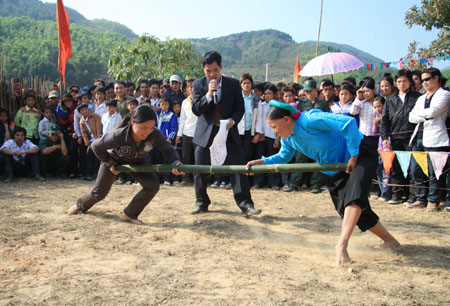Positive change after over ten years implementing Law on Cultural Heritage in Quang Ninh province
 (Hanoitourist) - After more than ten years implementing the Law on Cultural Heritage in Quang Ninh province, the preservation and promotion of cultural heritage in the province has seen a positive shift. As a result, many tangible and intangible cultural heritages have been effectively preserved.
(Hanoitourist) - After more than ten years implementing the Law on Cultural Heritage in Quang Ninh province, the preservation and promotion of cultural heritage in the province has seen a positive shift. As a result, many tangible and intangible cultural heritages have been effectively preserved.
The Law on Cultural Heritage was promulgated in 2001 and came into effect on January 1st 2002.
Now, there are 626 historical and cultural relics, and beautiful landscapes in the province. Three of them, including Ha Long Bay, Yen Tu historical relics and landscape, and Bach Dang victory historical relics, were recognized as special national relics. 64 others were recognized as national relics and 62 were recognized as provincial relics.
Being aware of the importance and role of relics in daily and spiritual life, and their potential in socio-economic and cultural activities, authorities, organizations and people in the province joined hands in preserving historical relics and landscapes in the province. With capital from the state budget and socialization, over the past years, hundreds of relics in the province have been restored and upgraded according to procedures regulated by the State. This has played a positive role in serving the cultural and spiritual life of local people.
A part from the system of tangible cultural heritages, the province has thousands of intangible cultural heritages in the daily life of ethnic minority groups. Over the past time, many programmes and projects related to intangible cultural heritages have been carried out, helping many heritages continue to exist in spite of the danger of being lost. A project on investigating and making profiles on intangible cultural heritages started in 2011 and is expected to be completed in 2013. Two provincial level heritages, including a festival of the Dao Thanh Phan ethnic minority group and a festival of Tay ethnic people in the province, were on the list to propose for national intangible cultural heritages.
To preserve and promote the values of cultural heritage, a system of museums and commemorative houses were built in the provincial centre, districts and communes. Preserved objects are rare and precious documents for scientific research, meeting the demand of cultural enjoyment of people of all walks. The project on building Bai Tho cultural area and provincial museum and library has been invested and become a cultural and tourist destination for visitors, researchers and local people.
The province also has many values in archaeology. Archaeological discoveries showed that Quang Ninh was the site of one of the earliest human settlements in the country. They created a large cultural space with hundreds of heritages, including archaeological sites and important valuable historical relics such as Bach Dang pale ground, Dong Trong Cave, Lam Pagoda, etc. In 2011 and 2012, the province conducted dozens of archaeological excavations.
These results affirmed that the Law on Cultural Heritage was implemented and promoted effectively in the province. However, there were also many disadvantages in the implementation of the law. Many intangible cultural heritages remain in danger of being lost and need urgent protection. Apart from the above mention forms, other cultural heritages have not been investigated to collect and preserve, and popularized among local people. They are folklore literature, outstanding literary works and traditional medicine. Policies for people who participated in heritage protection also have shortcomings. There is no specific policy for people who look after the relics and folklore artisans.
To continue the promotion of cultural heritage protection, in the future, Quang Ninh provincial party committee and people in the province will continue improving the quality of preservation to ensure principles of international conventions and the Law on Cultural Heritage; combine relics restoration and improvement of technical facilities; collect and exhibit specific objects. The province will continue to strengthen scientific studies to meet demands of making projects and plans for preservation programmes, providing scientific basis for the socio-economic plan; appraise values in intangible cultural heritage in order to propose solutions to preserve festivals and other forms of arts effectively. With the care of the central government, ministries, local people, cultural heritage in the province has been promoted to be worthy of belief of people nationwide and international friends, contributing to creating the next cultural values for the province that is always new and developing.
Source: CPV










 Share:
Share:




